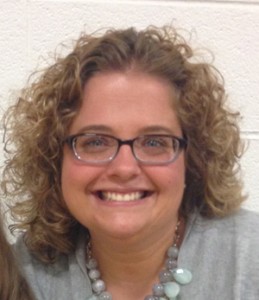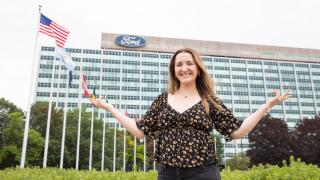

A group of students discuss the struggles faced by children of servicemen and women. Another works on an event for March of Dimes. And across the room, a group works on their presentation skills.
One thing is certain in Lisa Willerick’s classroom: This isn’t your grandma’s home economics class.
“I definitely teach a lot of life skills and learning how to be successful in your home, but the field of family and consumer sciences has grown,” said Willerick, a University of Michigan-Dearborn Ed.D. student who teaches family and consumer sciences at Romulus High School. “I’m teaching my students how to be competitive in the workplace and fluent in their relationships.”
That means class time focuses on personal growth, leadership and career preparation. Participation in the school’s chapter of Family, Career, and Community Leaders of America (FCCLA) is encouraged, and collaboration is king. It’s a mix that seems to resonate with students.
“The whole range of student ability level is present in my class. We have the valedictorians and salutatorians and we have the students who really struggle academically. They all still need to learn those important life skills,” Willerick said.
She has noticed a shift since starting at Romulus High School 10 years ago. Her classes once were nearly all female; now they’re split more evenly. And the school’s FCCLA chapter has grown from five students to 25.
This summer, 20 FCCLA students qualified for the national competition in San Antonio, the organization’s highest honor. Four of Willerick’s students earned gold medals, seven earned silver and four earned bronze in their events.
The program’s growth encourages Willerick; but the students’ personal growth most interests her. She’s seen quiet freshmen become national presenters by their senior year and students confidently pick career paths because of experiences they’ve had in FCCLA.
“Knowing Lisa, I’m not one bit surprised to learn of the success of her students. She’s an incredibly energetic person with real passion for teaching,” said education professor Paul Fossum.
Fossum currently oversees Willerick’s dissertation work—a comparative study of college access programs. It’s a subject inspired by her work at Romulus High School and with FCCLA.
“How do we increase access to post-secondary opportunities to underrepresented students? I live that every day, working with my students to help them make college a reality,” she said. “This has always been where my heart is and I want to have a bigger impact.”




